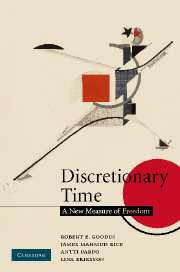Book contents
- Frontmatter
- Contents
- List of figures
- List of tables
- Preface
- Part I Introduction
- 1 Time and money
- 2 Discretionary time and temporal autonomy
- 3 The distribution of discretionary time
- Part II Time pressure
- Part III Welfare regimes matter
- Part IV Gender regimes matter
- Part V Household regimes matter
- Part IV Conclusions
- Appendix 1 Methodology
- Appendix 2 Data
- Bibliography
- Index
2 - Discretionary time and temporal autonomy
Published online by Cambridge University Press: 28 October 2009
- Frontmatter
- Contents
- List of figures
- List of tables
- Preface
- Part I Introduction
- 1 Time and money
- 2 Discretionary time and temporal autonomy
- 3 The distribution of discretionary time
- Part II Time pressure
- Part III Welfare regimes matter
- Part IV Gender regimes matter
- Part V Household regimes matter
- Part IV Conclusions
- Appendix 1 Methodology
- Appendix 2 Data
- Bibliography
- Index
Summary
This chapter is devoted to methodological preliminaries. In it, we argue philosophically why ‘autonomy’ in general matters, and why ‘temporal autonomy’ in particular matters as an aspect of that (section 2.1). We go on to explain technically how we measure ‘discretionary time’, which is our operational indicator of ‘temporal autonomy’ (section 2.2). We end by validating that empirical indicator sociologically, demonstrating that having ‘discretionary time’ of that sort is a significant influence on the extent to which people both subjectively ‘feel rushed’ and are ‘happy with their lives as a whole’ (section 2.3).
The value of temporal autonomy
Our particular concern in this book is with ‘temporal autonomy’, and with ‘discretionary time’ as a manifestation of that. The reason that temporal autonomy matters is that autonomy itself matters. Thus it behooves us to step back briefly from temporal issues to consider that broader moral notion, before delving into the peculiarities of the present ‘temporal’ application.
The concept of autonomy
Philosophers point to many kinds of freedom. ‘Autonomy’ refers to one's capacity to form principles of one's own and to act upon them. To be autonomous is ‘to decide for oneself what one shall do’. Philosophically, that is arguably the most important kind of freedom, being as it is a necessary condition for leading a moral life at all.
Despite being a (perhaps ‘the’) pre-eminent moral good, autonomous control over one's life is not the only moral good there is.
- Type
- Chapter
- Information
- Discretionary TimeA New Measure of Freedom, pp. 27 - 60Publisher: Cambridge University PressPrint publication year: 2008



